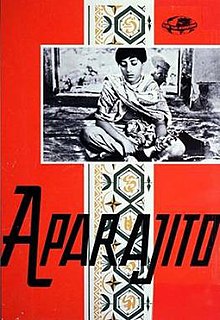story of movie ;- Aparajito | অপরাজিত | Award Winning Bengali Movie | Satyajit Ray ( free movie from you yube )
Aparajito
From Wikipedia, the free encyclopedia
| Aparajito | |
|---|---|

A poster of Aparajito
| |
| Directed by | Satyajit Ray |
| Produced by | Epic Films (Satyajit Ray) |
| Screenplay by | Satyajit Ray |
| Based on | Pather Panchali and Aparajita by Bibhutibhushan Bandopadhyay |
| Starring | Kanu Banerjee Karuna Banerjee Pinaki Sen Gupta Smaran Ghosal Ramani Sen Gupta Charaprakash Ghosh Subodh Ganguly |
| Music by | Ravi Shankar |
| Cinematography | Subrata Mitra |
| Edited by | Dulal Dutta |
| Distributed by | Merchant Ivory Productions / Sony Pictures Classics (In US) |
Release date
| 11 October 1956 |
Running time
| 113 minutes |
| Country | India |
| Language | Bengali |
Aparajito (Bengali: অপরাজিত Ôporajito; The Unvanquished) is a 1956 Indian Bengali drama film directed by Satyajit Ray (1921–1992), and is the second part of The Apu Trilogy. It is adapted from the last one-fifth of Bibhutibhushan Bannerjee's novel Pather Panchali (1929) and the first one-third of its sequel Aparajito (1932).[1] It starts off where the previous film Pather Panchali (1955) ended, with Apu's family moving to Varanasi, and chronicles Apu's life from childhood to adolescence in college, right up to his mother's death, when he is left all alone.
When Ray started making Pather Panchali, he had no plans of following it up with a sequel. The critical and commercial success of the film prompted him to start making Aparajito.[2] Unlike his previous venture, where he stayed faithful to the novel, Ray took some bold artistic decisions here, such as portraying the relationship between Apu and his mother in a very different manner from the book. As a result, in contrast to its predecessor, the film was not received well locally; Ray recalled that "as for the suburban audience, it was shocked by the portrayal of the mother and son relationship, so sharply at variance with the conventional notion of mutual sweetness and devotion".[3]
Critical reception outside of India, however, was overwhelmingly positive. It won 11 international awards, including the Golden Lion and Critics Award at the Venice Film Festival, becoming the first ever film to win both.[4] Veteran film-maker Mrinal Sen said he considers it to be one of the best Indian movies he had ever seen.[5] Bosley Crowther said that "It is done with such rare feeling and skill at pictorial imagery, and with such sympathetic understanding of Indian character on the part of Mr. Ray, that it develops a sort of hypnotism for the serene and tolerant viewer."[6] The critical acclaim this movie received encouraged Ray to make another sequel, Apur Sansar (1959), which was equally well received, and thus concluded one of the most critically acclaimed movie trilogies of all time, as Roger Ebert later pointed out—"The three films ... swept the top prizes at Cannes, Venice and London, and created a new cinema for India — whose prolific film industry had traditionally stayed within the narrow confines of swashbuckling musical romances. Never before had one man had such a decisive impact on the films of his culture."[7]
Plot summary[edit]
In 1920, Apu (Pinaki Sen Gupta) and his parents, who have left their home in rural Bengal, have settled into an apartment in Varanasi where his father Harihar (Kanu Banerjee) works as a priest. Harihar is making headway in his new pursuits: praying, singing, and officiating among the ghats on the sacred river Ganges. Harihar catches a fever and soon dies, however, and his wife Sarbajaya (Karuna Banerjee) is forced to begin work as a maid. With the assistance of a great-uncle, Apu and his mother return to Bengal and settle in the village Mansapota. There Apu apprentices as a priest, but pines to attend the local school which his mother is persuaded to allow. He excels at his studies, impressing a visiting dignitary, and the headmaster takes special interest in him.
Within a few years, the teenaged Apu (now played by Smaran Ghosal) has done well enough to receive a scholarship to go to Calcutta for further studies. Sarbajaya feels abandoned and frightened by this, but gives in and lovingly packs his suitcase. Apu travels by train to the city and starts working at a printing press, after school hours, to subsist. He becomes more accustomed to the city life and feels out of place in the village. Sarbajaya expects visits from him, but he visits only a few times. Her loneliness and yearning for her son continue to grow. She becomes seriously ill, but does not disclose her illness to Apu, lest his studies get disturbed. When Apu finally comes to know about her poor health, he returns to the village to find that she has died. Bhabataran, Apu's great uncle, requests that he stay there and work as a priest. Apu rejects the idea and returns to Calcutta
মন্তব্যসমূহ
একটি মন্তব্য পোস্ট করুন